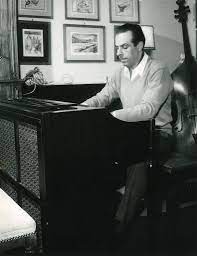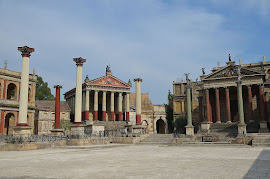NEW - Piero Piccioni – film music composer and lawyer
Politician’s son gave up legal practice to write movie scores
Pianist, conductor and prolific composer Piero Piccioni was born on this day in 1921 in Turin in the northern region of Piedmont. A self-taught musician, Piccioni became a composer of film soundtracks, writing more than 300 scores, themes and songs for top directors such as Francesco Rosi, Luchino Visconti, Bernardo Bertolucci, Roberto Rossellini and Vittoria De Sica. Piccioni had come into contact with the film industry during the 1950s while practising as a lawyer in Rome and working to secure movie rights for Italian distributors such as Titanus and De Laurentiis. His interest in music had started as a result of being taken to concerts by his father, Attillio Piccioni, who was a prominent Christian Democrat politician. Although Piccioni never studied music formally, he became a talented musician by teaching himself. He had listened to jazz during his childhood and was a fan of Art Tatum and Charlie Parker. He was also influenced by 20th century classical composers and American cinematography and he started writing songs of his own. Read more...
_________________________________________________________
Luigi Lablache – opera star
19th century giant was Queen Victoria’s singing coach
The singer Luigi Lablache, whose powerful but agile bass-baritone voice and wide-ranging acting skills made him a superstar of 19th century opera, was born in Naples on this day in 1794. Lablache was considered one of the greatest singers of his generation; for his interpretation of characters such as Leporello in Mozart’s Don Giovanni, Geronimo in Domenico Cimarosa’s Il matrimonio segreto, Gottardo the Podestà in Gioachino Rossini’s La gazza ladra, Henry VIII in Gaetano Donizetti’s Anna Bolena and Oroveso in Vincenzo Bellini’s Norma he had few peers. Donizetti created the role of Don Pasquale in his comic opera of the same name specifically for Lablache. Lablache performed in all of Italy’s major opera houses and was a star too in Vienna, London, St Petersburg and Paris, which he adopted as his home in later life, having acquired a beautiful country house at Maisons-Laffitte, just outside the French capital. He was approached to give singing lessons to the future Queen Victoria a year before she inherited the English throne, in 1836. He found the future queen to have a clear soprano voice and a keen interest in music and opera and they developed a close bond. Read more…
___________________________________________________________
Baldassare Castiglione – courtier and diplomat
Writer left a definitive account of life at court in Renaissance Italy
Baldassare Castiglione, the author of the Italian classic, The Book of the Courtier, was born on this day in 1478 near Mantua in Lombardy. His book about etiquette at court and the ideal of the Renaissance gentleman, has been widely read over the years and was even a source of material for Shakespeare after it was translated into English. Castiglione was born into a noble household and was related on his mother’s side to the powerful Gonzaga family of Mantua. After studying in Milan he succeeded his father as head of the family and was soon representing the Gonzaga family diplomatically. As a result he met Guidobaldo da Montefeltro, Duke of Urbino, and later took up residence in his court, which was regarded as the most refined and elegant in Italy at the time and received many distinguished guests. The court was presided over by the Duke’s wife, Elisabetta Gonzaga, who impressed Castiglione so much that he wrote platonic sonnets and songs for her. During this time he also became a friend of the painter, Raphael, who painted a portrait of him. Castiglione later took part in an expedition against Venice organised by Pope Julius II during the Italian wars. Read more…
_________________________________________________________
Andrea Agnelli - Juventus chairman
Fourth member of famous dynasty to run Turin club
The businessman Andrea Agnelli, who since 2010 has been chairman of Italy’s leading football club, Juventus, was born on this day in 1975 in Turin. He is the fourth Agnelli to take the helm of the famous club since 1923, when his grandfather, Edoardo, took over as president and presided over the club’s run of five consecutive Serie A titles in the 1930s. Andrea’s father, Umberto, and his uncle, the flamboyant entrepreneur Gianni Agnelli, also had spells running the club, which has been controlled by the Agnelli family for 88 years, with the exception of a four-year period between 1943 and 1947. The family still owns 64% of the club. As well as being chief operating officer of Fiat, which was founded by Andrea’s great-grandfather, Giovanni, Umberto was a Senator of the Italian Republic. On his mother’s side, Andrea has noble blood. Donna Allegra Caracciolo di Castagneto is the first cousin of Marella Agnelli - Gianni’s widow - who was born Donna Marella Caracciolo di Castagneto and is the daughter of Filippo Caracciolo, 8th Prince di Castagneto, 3rd Duke di Melito, and a hereditary Patrician of Naples. Andrea had a private education St Clare's, an independent college in Oxford, England, and at Bocconi University in Milan. Read more…
__________________________________________________________
Niccolò Zucchi – astronomer
Jesuit's invention gave him a clear view of the planets
Niccolò Zucchi, who designed one of the earliest reflecting telescopes, was born on this day in 1586 in Parma. His invention enabled him to be the first to discover the belts on the planet Jupiter and to examine the spots on the planet Mars. This was before the telescopes designed by James Gregory and Sir Isaac Newton, which, it has been claimed, were inspired by Zucchi’s book, Optica philosophia. Zucchi studied rhetoric in Piacenza and philosophy and theology in Parma before entering the Jesuit order in Padua at the age of 16. He taught mathematics, rhetoric and theology at the Collegio Romano in Rome and was then appointed rector of a new Jesuit college in Ravenna. He then served as apostolic preacher (the preacher to the Papal household) for about seven years. Zucchi published several books about mechanics, magnetism, barometers and astronomy. When he was sent with other papal officials to the court of Ferdinand II, he met the German mathematician and astronomer, Johannes Kepler, who encouraged his interest in studying the planets. They carried on writing to each other after Zucchi returned to Rome. Read more…

















